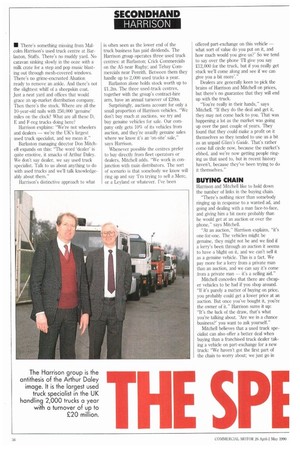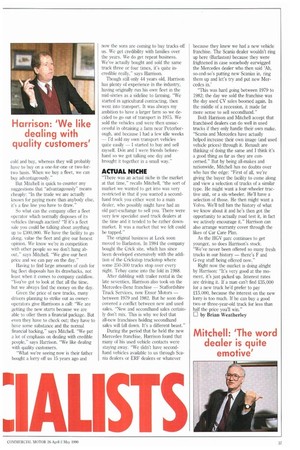• There's something missing from Malcolm Harrison's used truck centre
Page 38

Page 39

If you've noticed an error in this article please click here to report it so we can fix it.
at Barlaston, Staffs. There's no muddy yard. No caravan sinking slowly in the ooze with a milk crate for a step and pop music blasting out through mesh-covered windows. There's no grime-encrusted Alsation ready to remove an ankle. And there's not the slightest whiff of a sheepskin coat. Just a neat yard and offices that would grace an up-market distribution company. Then there's the stock. Where are all the 10-year-old nails with 250,000 'genuine' miles on the clock? What are all these D, E and F-reg trucks doing here?
Harrison explains: "We're not wheelers and dealers — we're the UK's largest used truck specialist, and we mean it."
Barlaston managing director Don Mitchell expands on this: "The word 'dealer' is quite emotive, it smacks of Arthur Daley. We don't say dealer, we say used truck specialist. Talk to us about anything to do with used trucks and we'll talk knowledgeably about them."
Harrison's distinctive approach to what is often seen as the lower end of the truck business has paid dividends. The Harrison group operates three used truck centres: at Barlaston; Crick Commercials on the A5 near Rugby; and Tebay Commercials near Penrith. Between them they handle up to 2,000 used trucks a year.
Barlaston alone holds stock worth up to 21.2m. The three used-truck centres, together with the group's contract-hire arm, have an annual turnover of £20m.
Surprisingly, auctions account for only a small proportion of Harrison vehicles. "We don't buy much at auctions, we try and buy genuine vehicles for sale. Our company only gets 10% of its vehicles from auction, and they're usually genuine sales where we know it's an 'on-site' sale," says Harrison.
Whenever possible the centres prefer to buy directly from fleet operators or dealers, Mitchell adds. "We work in conjunction with main distributors. The sort of scenario is that somebody we know will ring up and say 'I'm trying to sell a Mere, or a Leyland or whatever. I've been offered part-exchange on this vehicle — what sort of value do you put on it, and how much would you give us?' So we tend to say over the phone 'I'll give you say £12,000 for the truck, but if you really get stuck we'll come along and see if we can give you a bit more'."
Dealers are generally keen to pick the brains of Harrison and Mitchell on prices, but there's no guarantee that they will end up with the truck.
"You're really in their hands," says Mitchell. "If they do the deal and get it, they may not come back to you. That was happening a lot as the market was going up over the past couple of years. They found that they could make a profit on it themselves so they tended to use us a bit as an unpaid Glass's Guide. That's rather come full circle now, because the market's ebbed, and we're now getting people ringing us that used to, but in recent history haven't, because they've been trying to do it themselves."
BUYING CHAIN
Harrison and Mitchell like to hold down the number of links in the buying chain.
"There's nothing nicer than somebody ringing up in response to a wanted ad, and going and dealing with a man face-to-face, and giving him a bit more probably than he would get at an auction or over the phone," says Mitchell.
"At an auction," Harrison explains, "it's one-for-one. The vehicles might be genuine, they might not be and we find if a lorry's been through an auction it seems to have a blight on it, and we can't sell it as a genuine vehicle. This is a fact. We pay more for a lorry from a private man than an auction, and we can say it's come from a private man — it's a selling aid."
Mitchell concedes that there are cheaper vehicles to be had if you shop around. "If it's purely a matter of buying on price, you probably could get a lower price at an auction. But once you've bought it, you're the owner of it." Harrison sums it up: "It's the luck of the draw, that's what you're talking about. 'Are we in a chance business?' you want to ask yourself."
Mitchell believes that a used truck specialist can also offer a better deal when buying than a franchised truck dealer taking a vehicle on part-exchange for a new truck: "We haven't got the first part of the chain to worry about; we just go in cold and buy, whereas they will probably have to buy on a one-for-one or two-fortwo basis. When we buy a fleet, we can buy advantageously."
But Mitchell is quick to counter any suggestions that "advantageously" means cheaply: "In the trade we are actually known for paving more than anybody else, it's a line line you have to draw."
So what can the company offer a fleet operator which normally disposes of its vehicles through auction? "If it's a fleet sale you could be talking about anything up to £300,000. We have the facility to go along, value the fleet and give our honest opinion. We know we're in competition with other people so we don't hang about," says Mitchell. "We give our best price and we can pay on the day."
Ilaving to find large amounts of cash for big fleet disposals has its drawbacks, not least when it comes to company cashflow. "You've got to look at that all the time, but we always find the money on the day.
Given the price of new trucks, many drivers planning to strike out as owneroperators give Harrisons a call: "We are getting the new starts because we are able to offer them a financial package. But even they have to check out; they have to have some substance and the normal financial backing," says Mitchell. "We put a lot of emphasis on dealing with credible people," says Harrison. "We like dealing with quality customers.
"What we're seeing now is their father bought a lorry off us 15 years ago and now the sons are coming to buy trucks off us. We get credibility with families over the years. We do get repeat business. We've actually bought and sold the same truck three or four times, it's quite incredible really," says Harrison.
Though still only 44 years old, Harrison has plenty of experience in the industry, having originally run his own fleet in the mid-sixties as a sideline to farming. "We started in agricultural contracting, then went into transport. It was always my ambition to have a larger farm so we decided to go out of transport in 1975. We sold the vehicles and were then unsuccessful in obtaining a fartn near Peterborough, and because I had a few idle weeks — I'd sold my own transport vehicles quite easily — I started to buy and sell myself. I)(in and I were friends beforehand so we got talking one clay and brought it together in a small way."
ACTUAL NICHE
"There was an actual niche in the market at that time," recalls Mitchell, "the sort of market we wanted to get into was very restricted in that if you wanted a secondhand truck you either went to a main dealer, who possibly might have had an old part-exchange to sell you. There were very few specialist used truck dealers at the time and it tended to be rather downmarket. It was a market that we felt could be tapped."
The original business at Leek soon moved to Barlaston. In 1984 the company bought the Crick site, which has since been developed extensively with the addition of the Crickstop truckstop where some 250-300 trucks stop over every night. Tebay came into the fold in 1988.
After dabbling with trailer rental in the late seventies, Harrison also took on the Mercedes-Benz franchise — Staffordshire Truck Services, now Ensor Motors — between 1979 and 1982. But he soon discovered a conflict between new and used sales. "New and secondhand sales certainly don't mix. This is why we feel that all-new franchises holding secondhand sales will fall down. It's a different beast."
During the period that he held the new Mercedes franchise, Harrison found that many of his used vehicle contacts were staying away. "We didn't have secondhand vehicles available to us through Scania dealers or ERF dealers or whatever because they knew we had a new vehicle franchise. The Scania dealer wouldn't ring up here (Barlaston) because they were frightened in case somebody earwigged the Mercedes dealer who then said Ali, so-and-so's putting new Scanias in, ring them_ up and let's try and put new Mercedes in.'
"This was hard going between 1979 to 1982; the day we sold the franchise was the day used CV sales boomed again. In the middle of a recession, it made far more sense to sell secondhand."
Both Harrison and Mitchell accept that franchised dealers can do well in used trucks if they only handle their own make. "Scania and Mercedes have actually helped increase their own image (and used vehicle prices) through it. Renault are thinking of doing the same and I think it's a good thing as far as they are concerned." But by being all-makes and nationwide, Mitchell has no doubts over who has the edge: "First of all, we're giving the buyer the facility to come along and view a selection of trucks of a similar type. He might want a four-wheeler tractive unit, or a six-wheeler. He'll have a selection of those. He then might want a Volvo. We'll tell him the history of what we know about it and he's then got the opportunity to actually road test it, in fact we actively encourage it." Harrison can also arrange warranty cover through the likes of Car Care Plan.
As the IIGV parc continues to get younger, so does Harrison's stock. "We've never been offered so many fresh trucks in our history — there's F and G-reg stuff being offered now."
Right now the market is doing alright by Harrison: "It's very good at the moment, it's just picked up. Interest rates are driving it. if a man can't find .Z35,000 for a new truck he'd prefer to pay £15,000, because the interest on the new lorry is too much. If he can buy a good two or three-year-old truck for less than half the price you'll win."
Ei by Brian Weatherley
























































































































